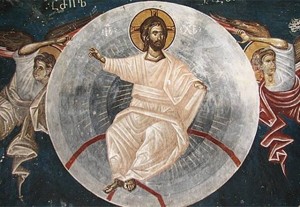 Today (May 10, 2015), Mother Abbess Lucia received the Abbatial Blessing from the Most Reverend Leonard P. Blair, S.T.D., Archbishop of Hartford. She was elected as the Third Abbess of the Abbey of Regina Laudis on February 1. She is one of two Benedictine abbesses in the USA.
Today (May 10, 2015), Mother Abbess Lucia received the Abbatial Blessing from the Most Reverend Leonard P. Blair, S.T.D., Archbishop of Hartford. She was elected as the Third Abbess of the Abbey of Regina Laudis on February 1. She is one of two Benedictine abbesses in the USA.
Present for the Mass and the monastic rite were the new Abbess’ parents, siblings, many guests of the abbey including monks and nuns from other abbeys and monasteries from the area. For the first time in the history of the abbey, the abbess received the crosier (something the founding abbess and the second abbess requested but didn’t receive). The gesture has profound meaning in the life of this great Benedictine community of women.
This image iterates the Abbess’ coat of arms.
Archbishop Blair prayed:
Almighty God and Father, you sent your only Son into the world to minister to mankind, and, as the good shepherd, to give his life for his sheep. Suppliant, we beseech you to bless and strengthen your servant Lucia, chosen to be abbess of this monastery. Grant that through the shining example of her monastic way of life, she may show herself to be what she is called; and let her know that it is her duty rather to profit her sisters than to preside over them. Therefore, under your inspiration, let her exercise the greatest solicitude; and let her always temper and arrange all things so that all, continually advancing in the love of Christ and fraternal charity, may with enlarged hearts hasten along the way of your commandments. Deign to fill her with the gift of your Spirit, O Lord, that she may be inflamed with love for your glory and the service of the Church and unceasingly impel her sisters likewise. Let her prefer nothing whatever to Christ, that when He comes on the last day, she may merit to attain your kingdom together with her sisters. Through Our Lord Jesus Christ your Son, who lives and reigns with you in the unity of the Holy Spirit, God, forever and ever. Amen


